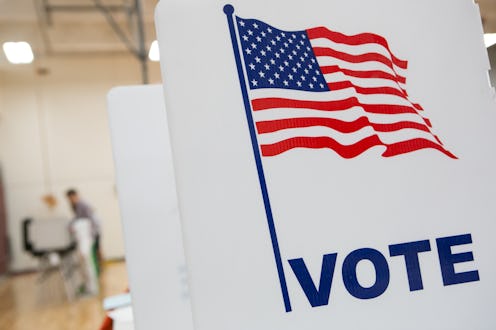News
Maryland's Closed Primary System May Hurt Sanders
Maryland's primary is on Tuesday, and for the first time in a long time, the delegate count in both parties is extremely close. Close elections tend to have high voter turnout, but there's a group of Marylanders that shouldn't get too excited — at least not about having their own voice heard. That's because there's one important detail that some didn't consider on time: You cannot vote in Maryland's primary if you're an independent.
That's right: Independent voters hoping to participate in the presidential contest on Tuesday unfortunately cannot do so. Primaries in Maryland are only open to registered members of political parties, and the last day to change your registration was April 5. The only exception would be local, non-partisan offices like school board that might be elected the same day. Any independents — or as Maryland calls them, "unaffiliated" voters — will have to wait until November to get a say.
Despite this closed primary system, the number of independent voters in Maryland has increased in the last 10 years, by as much as 57 percent according to numbers from the Maryland State Board of Elections, the Baltimore Sun reported. Some 672,000 Maryland voters are unaffiliated.
Under Maryland law, the parties could decide to let unaffiliated voters participate, but they would have to notify the election board six months in advance, something neither party decided to do for the 2016 vote. The Republicans did so in 2000 and briefly considered it in 2014, but there was not enough support to try again; leaders claimed it did not significantly increase turnout.
The closed primary could hurt Sanders. He has been largely popular among independents, despite his aim to come at Clinton from the left. Take New Hampshire for example, where he won the primary in February. There, he won Democrats by just 4 percentage points, but he won independents by 50. New Hampshire, as well as Michigan and Wisconsin, where Sanders also won, have open primaries.
Dan Hopkins from FiveThirtyEight hypothesized that this has to do with their disdain for partisan politics, and not so much their support of Sanders' progressive policy positions. The average independent who supports Sanders, he claims, is much like the majority of Sander's supporters: male, white, higher-income, and not huge fans of Barack Obama. These independent voters — unless they re-registered — are not able to support Sanders Tuesday.
Even if they had registered, it might not make a difference in the Maryland race. Polls say Clinton has a lead in the state of about 23 percentage points, and FiveThirtyEight is calling the race for Clinton with a 97 percent chance of winning. Even a strong showing among independents wouldn't be able to close that gap. Nonetheless their inability to vote if they were unaware of the deadline may further alienate them from the political process and make it harder to motivate them to turn out in November if Clinton wins.
On the GOP side, Trump blustered about the closed primary system in New York that happened earlier in the week. Even his own children can't vote for him because they missed the deadline. Given his outsider status, you might think that Trump will suffer from the closed primary, but there's less evidence to support that. His net favorability rating (granted this is from back in January) among independent voters was -27 percent. Among Republicans it was +27.
Trump will likely win Maryland regardless of independents' participation. Polls currently place him in first with almost 41 percent. Kasich and Cruz, as usual, split the rest. Trump has an 80-percent chance of winning according to FiveThirtyEight.
Independent voters may not get their say now, but you can bet you'll hear from them in November, when they'll likely decide the election.
